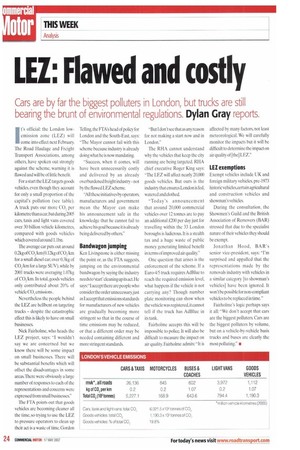LEZ: Flawed and costly
Page 24

If you've noticed an error in this article please click here to report it so we can fix it.
Cars are by far the biggest polluters in London, but trucks are still bearing the brunt of environmental regulations. Dylan Gray reports.
It's official: the London lowemission zone (LEZ) will come into effect next February. The Road Haulage and Freight Transport Associations, among others, have spoken out strongly against the scheme, warning it is flawed and will be of little benefit.
For a start the LEZ targets goods vehicles, even though they account for only a small proportion of the capital's pollution (see table). A truck puts our more CO, per kilometre than a car, but during2005 cars, taxis and light vans covered over 30 billion vehicle kilometres, compared with goods vehicles which covered around 1.1bn.
The average car puts out around 0.2kg of CO,/km (0.12kg of CO2/1un for a small diesel car; over 0.3kg of CO2/km for a large SUV), while by 2001 trucks were averaging 1.07kg of CO2/km. In total, goods vehicles only contributed about 20% of vehicle CO, emissions.
Nevertheless the people behind the LEZ are hellbent on targeting trucks — despite the catastrophic effect this is likely to have on small businesses.
Nick Fairhohne, who heads the LEZ project, says: "1 wouldn't say we are concerned but we know there will he some impact on small businesses. There will be substantial benefits which will offset the disadvantages in some areas.There were obviously a large number of responses to each of the representations and concerns were expressed from small businesses."
The FTA points out that goods vehicles are becoming cleaner all the time, so trying to use the LEZ to pressure operators to clean up their act is a waste of time. Gordon Telling, the FTA's head of policy for London and the South-East, says: "The Mayor cannot fail with this scheme because industry is already doing what he is now mandating.
"Success, when it comes, will have been unnecessarily costly and delivered by an already overburdened freight industry—not by the flawed LEZ scheme.
"All these initiatives by operators, manufacturers and government mean the Mayor can make his announcement safe in the knowledge that he cannot fail to achieve his goal because it is already being delivered by others."
Bandwagon jumping
Ken Livingstone is either missing the point or, as the FTA suggests, jumping on the environmental bandwagon by saying the industry needs to`start'deaning up its act.He says:"I accept there are people who consider the order unnecessaryjust as I accept that emissions standards for manufacturers of new vehicles are gradually becoming more stringent so that in the course of time emissions may be reduced, or that a different order may be needed containing different and more stringent standards. "But I don't see that as anyreason for not making a start now and in London."
The RHA cannot understand why the vehicles that keep the city running are being targeted. RHA chief executive Roger King says: "The LEZ will affect nearly 20,000 goods vehicles. But ours is the industry that ensures London is fed, watered and clothed.
-Today's announcement that around 20,000 commercial vehicles over 12 tonnes are to pay an additional f200 per day just for travelling within the 33 London boroughs is ludicrous. It is a stealth tax and a huge waste of public money generating limited benefit in terms of improved air quality" One question that arises is the enforcement of the scheme. If a Euro-4/5 truck requires AdBlue to reach the required emission level, what happens if the vehicle is not carrying any? Though number plate monitoring can show when the vehicle was registered,it cannot tell if the truck has AdBlue in its tank.
Fairhohne accepts this will be impossible to police. It will also be difficult to measure the impact on air quality. Fairhohne admits: "It is affected by many factors, not least meteorological. We will carefully monitor the impacts but it will be difficult to determine the impact on air quality of [the] LEZ."
LEZ exemptions
Exempt vehicles include UK and foreign military vehicles, pre-1973 historic vehicles,certain agricultural and construction vehicles and showman's vehicles.
During the consultation, the Showmen's Guild and the British Association of Removers (BAR) stressed that due to the specialist nature of their vehicles they should be exempt.
Jonathan Hood, BAR's senior vice-president, says: "I'm surprised and appalled that the representations made by the removals industry with Vehicles in a similar category [to showman's vehicles] have been ignored. It won't be possible for non-compliant vehicles to be replaced in time."
Fairholme's logic perhaps says it all: "We don't accept that cars are the biggest polluters. Cars are the biggest polluters by volume, but on a vehicle-by-vehicle basis trucks and buses are clearly the most polluting." •






























































































































































































